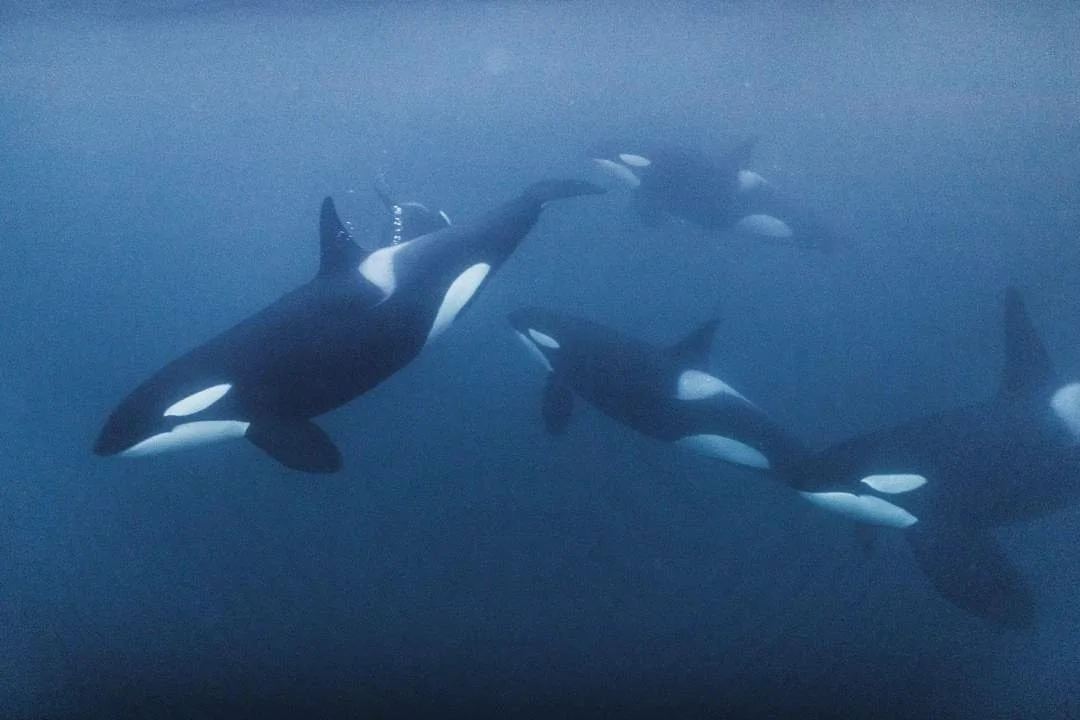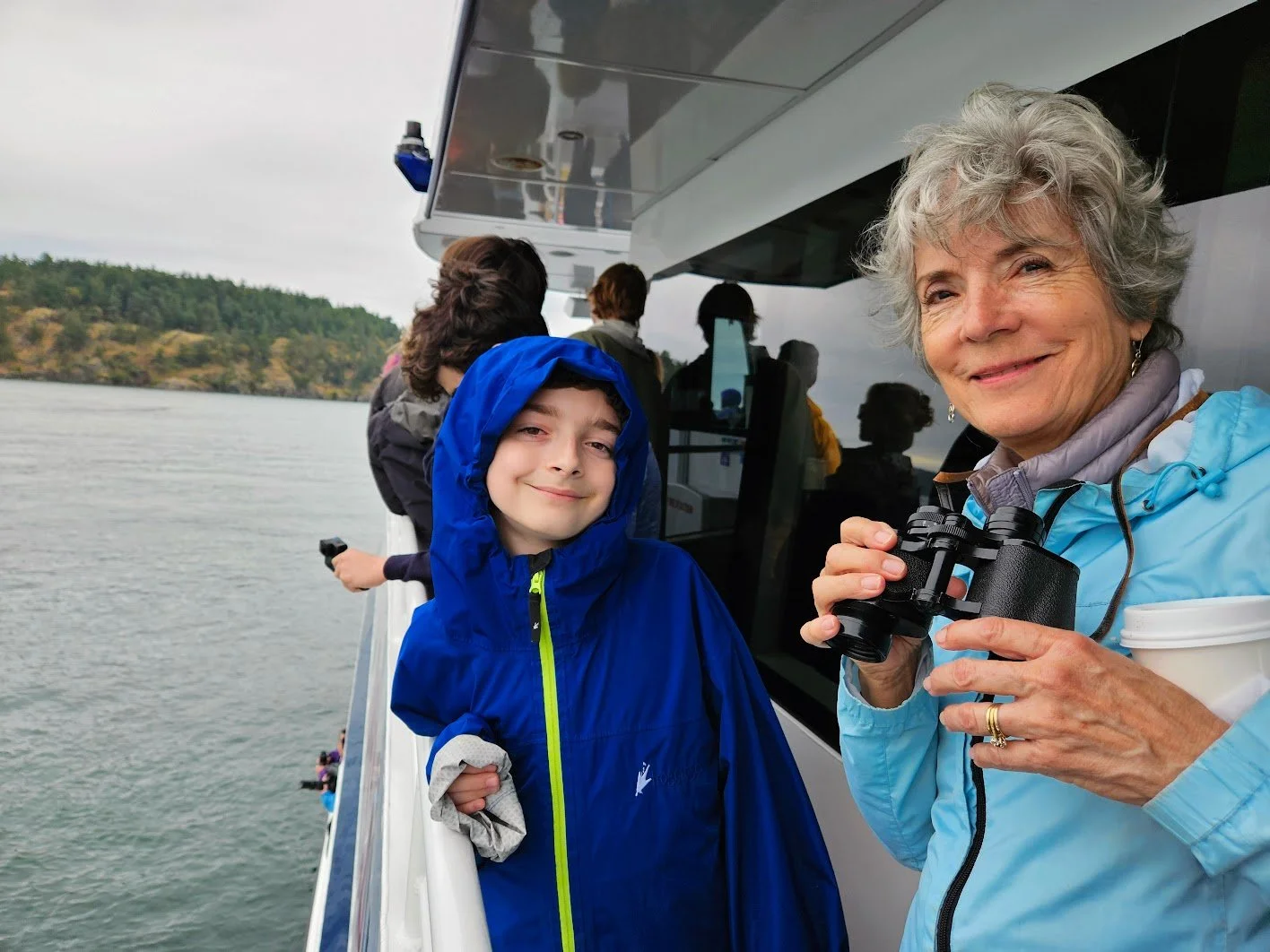Orca-nized wisdom & the evolutionary advantage of grandmothering
I promised that I’d come back to the topic of orcas and why they are relevant to my study of “The Sea & She”. Funny that I should choose to do so when I am now far from the ocean, high in the hills of Tanzania near Ngorongoro Crater. It is a stunning place to reflect on the past three weeks, to be sure, and I will soon have an opportunity to see some of the legendary scenery and wildlife on a safari.
In the three vastly different regions and cultures of sea women that I have studied on this trip, there are certainly some key similarities and throughlines that I will be exploring in the book I intend to write on this topic. Ideas around family, duty, love, and how the ocean connects and empowers us as women. Perhaps the most intriguing, to me at least, is the generational passing of knowledge, especially from mothers to daughters, and the role that grandmothers play in this as they continue to work in the sea for as long as they are physically capable. Grandmothering is a crucial constant.
This is where orcas come in.
Underwater view of a pod of orcas. Image credit: Philip Thurston/Getty Images.
Orcas are a highly matriarchal society. They are led by their grandmothers, and they stay with their mothers and grandmothers for their entire lives. Families will cross paths with other families for mating, but afterwards, males return to their own mothers and grandmothers. Several ecotypes have been observed to live the equivalent of human lifespans. They are very socially and emotionally complex, as well, possessing a highly developed lobe of their limbic system that corresponds to what neuroscientists believe may be a sense of collective identity.
In other ways, they are also exceedingly intelligent, particularly in their sound perception. Orcas’ sense of touch and sight is equivalent to ours, their sense of smell slightly worse than ours, but their sound world is something on an entirely different plane of existence from ours. When it comes to what they can know, understand, and perceive, they are most definitely self-aware (by human standards) and capable of basic reasoning and problem-solving. But when it comes to our understanding of their sonar world, we’ve got nothing. I was recently reading a book called Of Orcas and Men by David Neiwert, and he quoted a well-known orca neuroscientist, Lori Merino, stating that “cognitively speaking, orcas are pretty good humans, but humans are terrible orcas.”
The orcas of the Salish Sea alone have a diversity of cultural (yes, culture) practices in their different pods that have been recorded over the years, and continue to baffle and intrigue scientists. This has included wearing salmon as hats and, as recently documented, using kelp as a massage tool.
Some of the transient Salish Sea orcas I saw while whale watching with my family.
You may have seen orcas also gain notoriety in recent years for breaking apart yachts near the Iberian Peninsula, despite not displaying any aggressive behavior or ill-will towards humans, specifically (orcas have never attacked or harmed a human in the wild). And a recent meta-study has now shown that orcas across the world have been offering food to humans.
What is going on in their complex and brilliant minds? Are they simply playing with us? Do they recognize our sentience and are trying to communicate?
Now that you know why they are intriguing and awesome, on to why they are relevant to sea women and us humans in general.
As previously mentioned, orcas are matriarchal and led by their grandmothers. They are also one of only four other species of animals besides humans that experience complete menopause (the other three are beluga whales, narwhals, and short-finned pilot whales. Some primates and small mammals experience a menstural slowing, but not a full stop). Interesting that it is just us plus cetaceans, isn’t it? Maybe we are mermaids after all.
A common question in evolutionary biology has focused on the purpose of menopause and female longevity past reproductive age. What survival advantage must this have? The most common answer seems to be the “grandmother hypothesis”: that rather than have more offspring that are in competition with her existing daughters and their offspring, a grandmother dedicates her knowledge, leadership, and resources to ensuring the success and survival of her grandchildren, nieces, nephews, etc. This appears to have been an advantage when food is seasonal and scarce, and for animals whose reproductive strategies favor fewer offspring but investing a higher degree of maternal care.
My beautiful mother and her grandson, my Jack, while looking for orcas in the Salish Sea.
Western culture, in particular, tends to respect and regard women less with age. We decline in our reproductive capacity and in the cultural definition of physical beauty, and we start to become invisible. I am beginning to experience the latter as I progress through middle age and receive fewer stares and glances in public places. I admit this is a huge relief for me, personally, but the issue of perceived irrelevance is problematic for women on a larger level.
We have something rare, something evolutionarily powerful, something we share only with these brilliant, powerful sea creatures. We carry this amazing survival trait that has upheld our species through adversity.
Menopause is a superpower, and older women are evolved to lead.
This is where we can learn from orcas, and from the wisdom of the Coast Salish women seeking to reclaim their voices as fisherwomen, the haenyeo of Jeju continuing their centuries-old tradition of diving, and the single mothers of Zanzibar teaching their daughters and granddaughters to support themselves with seaweed and sponges.
Their passing along of knowledge is an act of hope as much as it is an act of survival.



